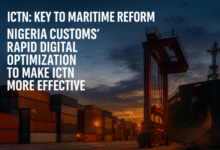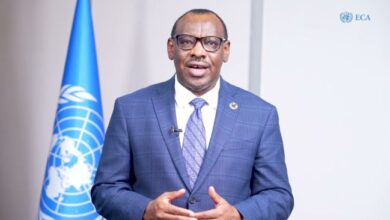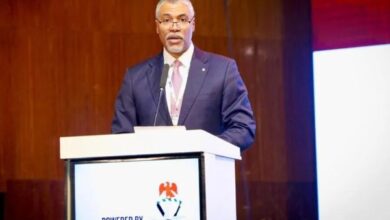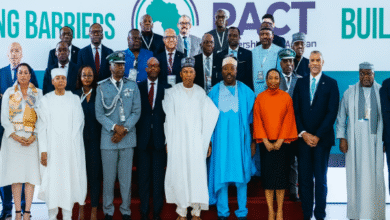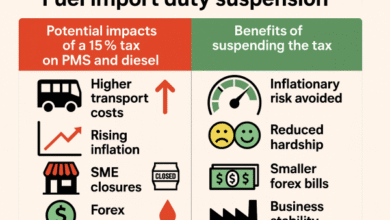Manufacturers Push for Removal of Trade Barriers to Unlock Nigeria’s AfCFTA Potential

The Manufacturers Association of Nigeria Export Promotion Group (MANEG) has renewed calls for a comprehensive review of trade barriers and protectionist policies that continue to undermine Nigerian exporters’ competitiveness within the African Continental Free Trade Area (AfCFTA).
Speaking at the 8th Annual General Meeting (AGM) of MANEG held in Lagos, stakeholders emphasized that without decisive reforms to dismantle both domestic and international trade bottlenecks, Nigeria risks being sidelined in the continental market integration agenda.
The meeting, themed “Difficulties in Export Trading under Multilateral Trade Agreements: A Threat to AfCFTA Implementation,” attracted industrial leaders, economists, and policymakers who collectively called for urgent government intervention to safeguard Nigeria’s manufacturing competitiveness.
Export: The Bedrock of National Economic Independence
Director-General of the Manufacturers Association of Nigeria (MAN), Mr. Segun Ajayi-Kadir, underscored that export remains the foundation of any country’s economic independence.
He noted that Nigeria’s inability to fully leverage its industrial potential stems from decades of inconsistent policy implementation and over-reliance on crude oil exports.
“The early years of independence held great promise for our economy, but successive governments failed to implement industrial policies that could have anchored long-term prosperity,” Ajayi-Kadir said.
While acknowledging President Bola Tinubu’s administration for its ongoing economic reforms, Ajayi-Kadir stressed that the time had come to translate reform intentions into measurable outcomes — especially in manufacturing and exports.
Exchange Rate and Export Competitiveness: A Silver Lining
Ajayi-Kadir observed that although the current exchange rate volatility has hurt importers, it could serve as a catalyst for export competitiveness — provided that Nigeria improves its logistics infrastructure and incentivizes exporters.
“A weaker naira can make Nigerian products more attractive in global markets,” he explained. “But without supportive export financing, logistics, and consistent incentives, we will lose that advantage.”
He emphasized that MANEG plays a vital role in strengthening Nigeria’s export ecosystem by tackling operational bottlenecks, advocating for fair trade agreements, and supporting manufacturers in expanding regional and global reach.
AfCFTA and ECOWAS: The Reality of Unmet Expectations
Chairman of MANEG, Mrs. Odiri Erewa-Meggison, said that while the African Continental Free Trade Area offers opportunities across 54 countries, unresolved challenges within the Economic Community of West African States (ECOWAS) could undermine Nigeria’s participation in the larger AfCFTA framework.
Citing data from the National Bureau of Statistics (NBS), Erewa-Meggison revealed that manufactured goods exports rose to ₦494.2 billion in Q4 2024, representing a 110.3% increase compared to the same period in 2023.
However, she noted that the growth figures mask the severe constraints facing Nigerian exporters.
“We still face high operational costs, inadequate infrastructure, port congestion, multiple taxes, and unpredictable exchange rates,” she said. “The reality for most manufacturers is that survival itself has become a daily struggle.”
Export Incentives and the Need for Policy Alignment
Erewa-Meggison urged the Federal Government to revive non-oil export incentives, especially the Export Expansion Grant (EEG), to help manufacturers remain competitive.
She argued that the delay in the disbursement of approved EEG payments has crippled many exporters who rely on the scheme to offset logistics and foreign exchange costs.
“If properly implemented, the EEG can be a lifeline for manufacturers navigating high-cost environments,” she added. “We are not asking for handouts but for policies that enable fair competition and reward value creation.”
Trade Barriers and the Risk of Policy Paralysis
Despite Nigeria’s commitment to AfCFTA, exporters continue to face restrictions such as tariff escalation, cumbersome border procedures, and inconsistent customs regulations.
Experts at the AGM agreed that unless these barriers are addressed, the AfCFTA will remain more of a policy aspiration than an operational reality.
“AfCFTA promises open markets, but the roadblocks at our borders tell a different story,” Erewa-Meggison observed. “We must fix our domestic systems before we can compete continentally.”
Academia’s View: Diversification as the Engine of Competitiveness
In his address, Prof. Olawale Ogunkola of the University of Ibadan’s Department of Economics stressed that Nigeria’s persistent overdependence on oil exports poses a systemic risk to long-term economic stability.
“Any shock to the oil market could cripple the entire economy,” Ogunkola warned. “The key lies in diversification, innovation, and value-added manufacturing that creates exportable goods beyond raw materials.”
He urged the government to adopt a whole-of-economy approach to trade, integrating fiscal incentives, infrastructure upgrades, and human capital development to reposition Nigeria as a global export hub.
From Policy to Action: The Way Forward
Industry experts at the forum agreed that while Nigeria has abundant potential, policy inconsistency and weak institutional coordination have hindered progress.
They called for stronger collaboration between the Ministries of Industry, Trade and Investment; Finance; and Foreign Affairs to harmonize export-related policies.
Key recommendations from the meeting include:
- Reviewing existing trade treaties to eliminate restrictive clauses.
- Establishing export-processing hubs with tax incentives.
- Expediting the disbursement of export grants and credit facilities.
- Enhancing transport infrastructure to reduce logistics costs.
- Strengthening the role of the Nigeria Export Promotion Council (NEPC) as a facilitator, not just a regulator.
BRANDECONOMY Analysis: Nigeria at a Crossroads
From a broader perspective, Nigeria stands at a critical juncture in its trade and industrial evolution.
The AfCFTA represents a once-in-a-generation opportunity for the country to transition from an import-dependent consumer economy to a value-creating export powerhouse.
However, the path forward demands not just rhetoric but decisive action — harmonized policies, improved infrastructure, and fiscal discipline.
For manufacturers, the immediate task is to innovate and integrate — adopting digital tools, building regional partnerships, and expanding their export readiness.
Conclusion: Turning AfCFTA into a Catalyst for Industrial Renewal
The Manufacturers Association of Nigeria Export Promotion Group’s call is both timely and strategic.
If Nigeria is to fully benefit from AfCFTA, it must rebuild confidence among exporters, remove domestic inefficiencies, and position manufacturing as the anchor of national prosperity.
At its core, the message from MANEG is clear:
Trade freedom without competitiveness is illusionary.
Nigeria must act now — or risk missing another historic chance to lead Africa’s economic renaissance.


